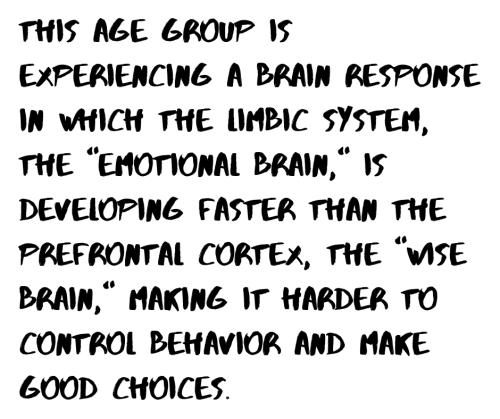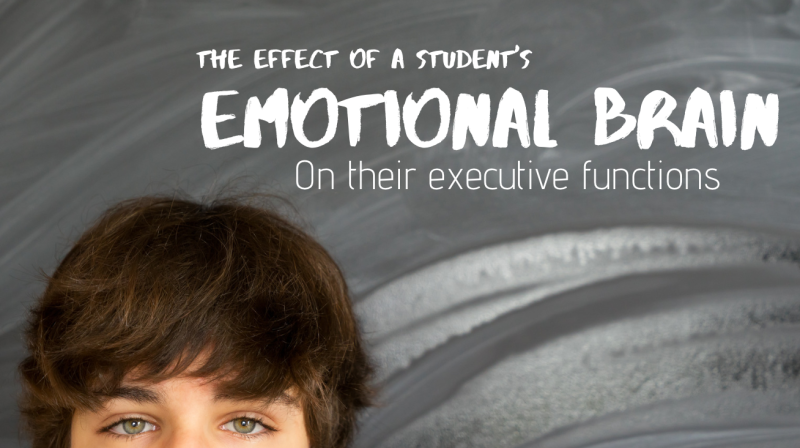When we focus on executive functions as they relate to time management and getting things done, it is easy to forget the elephant in the room – our emotional brain.
We want to believe that we are primarily rational thinking beings, in control of our choices with those occasional uncomfortable moments when emotions interfere. However, situations that activate our automatic protective “fight, flight or freeze responses” upset our balance and purposeful actions.
In other words, our emotions hijack our executive functioning abilities.
When it comes to the emotional brains of teenagers, well-meaning parents, educators and professionals can hyper-focus on productivity and goal-oriented strategies, oblivious to the underlying emotional issues that could be the root cause of poor executive functioning.
An Example of an Emotional Brain Hijacking
This idea was really driven home for me when a student reported that her past year hadn’t gone as well as she wanted. After I probed a bit, she told me she’d gotten all As and one B. What?! I told her those were great grades and that she should be very proud of the improvement over the previous year. Looking very downhearted and discouraged, she said she blew her final math exam. Her mind just wasn’t on the test.
When her mom left the room, the student said, “I know you are not a therapist, but can I tell you why I bombed the math test?”
When I nodded she said: “I had my first real boyfriend this year. It was great for months and then, right at finals he broke up with me. I’m still struggling with obsessing over why. It’s really hard to care about anything.”
 Oh… That was good information for me to have. She didn’t bomb the test – her emotional brain did.
Oh… That was good information for me to have. She didn’t bomb the test – her emotional brain did.
The pressures are so great during the late teens and early 20’s to achieve, achieve, achieve. A whole industry (which includes businesses like mine), has developed for parents to support that student achievement, usually aiming for the college dream.
As parents of teens know, the focus is on squeezing homework/studying, sports and extracurricular activities into a limited space of time. But there’s a whole lot more to being prepared for college, which was the topic in a recent Wall Street Journal article: Is Your Child Emotionally Ready for College?
Transitioning to college is increasingly difficult for our rising adults. According to the 2018 American College Health Association’s annual survey, more than 85% of college students described feeling overwhelmed. And 81% reported experiencing a sense that “things were hopeless.” This age group is experiencing a brain in which the limbic system, our emotional brain, is developing faster than the prefrontal cortex, our “wise” brain that helps to control our behavior and make good choices.
I often use the metaphor of rafting on a white water river to describe this time in a student’s life.

They go off to college, thrilled at the thought of the independence and activities freshman college life offers. They gleefully jump in their raft for the exciting adventure. Alas, weak executive functions and a domineering emotional brain can make for a rougher ride than planned. Before they know it, the water is moving fast, very fast. Their raft starts bouncing off of rocks and they lose their paddles. They get stuck in eddies and struggle to get moving, only to get swept away again by the current. Suddenly they are tossed out of the raft and inundated with water and crashing into rocks. Eventually they find themselves sitting on the river bank, bruised and battered wondering what happened to their glorious vision of college success?
One college student I shared this story with said, “Yup. That pretty much sums up my first year in college.”
Parents Need to be Aware
In my Seeing My Time course, we discuss brain development, noting that the prefrontal cortex is fully developed somewhere between 25-30+ years of age.
This sobering fact alerts parents that “rising adults” are just that: rising. They are not fully functioning adults, despite their legal status once they hit 18. Turning 18 simply means that students go off to college, where academic and student medical records cannot be accessed by parents without the student’s written permission. Parents can feel blindsided when struggling students hide or deny feeling socially isolated or experience failing grades. These are often warning signs, indicating that help is needed to stop the slide before the consequences of failure and isolation become truly difficult and expensive to repair. College advisors and mental health counselors cannot contact parents without that written permission.
Advice from an Executive Function Educator
While the authors of the Wall Street Journal article offer parental advice on different issues, I have one standard bit of advice I tell all of my parents during private Seeing My Time sessions. If the parents are paying for a college education, I advise them to inform their children that part of the agreement is that the student must sign the necessary permission for the parents to have access to both academic and health records. This information should only be accessed if students are not providing you proof of their grades or if their social/emotional behaviors are beginning to concern you.
Parents need to adjust their role to be more of a coach during this phase of life. It is actually good for your student to do some problem-solving and learn how to recover from problems without constant parental interventions. The late teens and 20’s are a time for experimenting and testing oneself in different situations. We learn from our mistakes. That said, the coach/parent should be watching from the sidelines to see if a timeout to regroup is needed. Better to intervene before a stretcher is required. I wish someone had given me this advice before my first child went off to college!
So keep an eye on those new college students. Their emotional brains can take them on rough rides that interfere with their executive functioning and academic success.
Marydee


Excellent!!